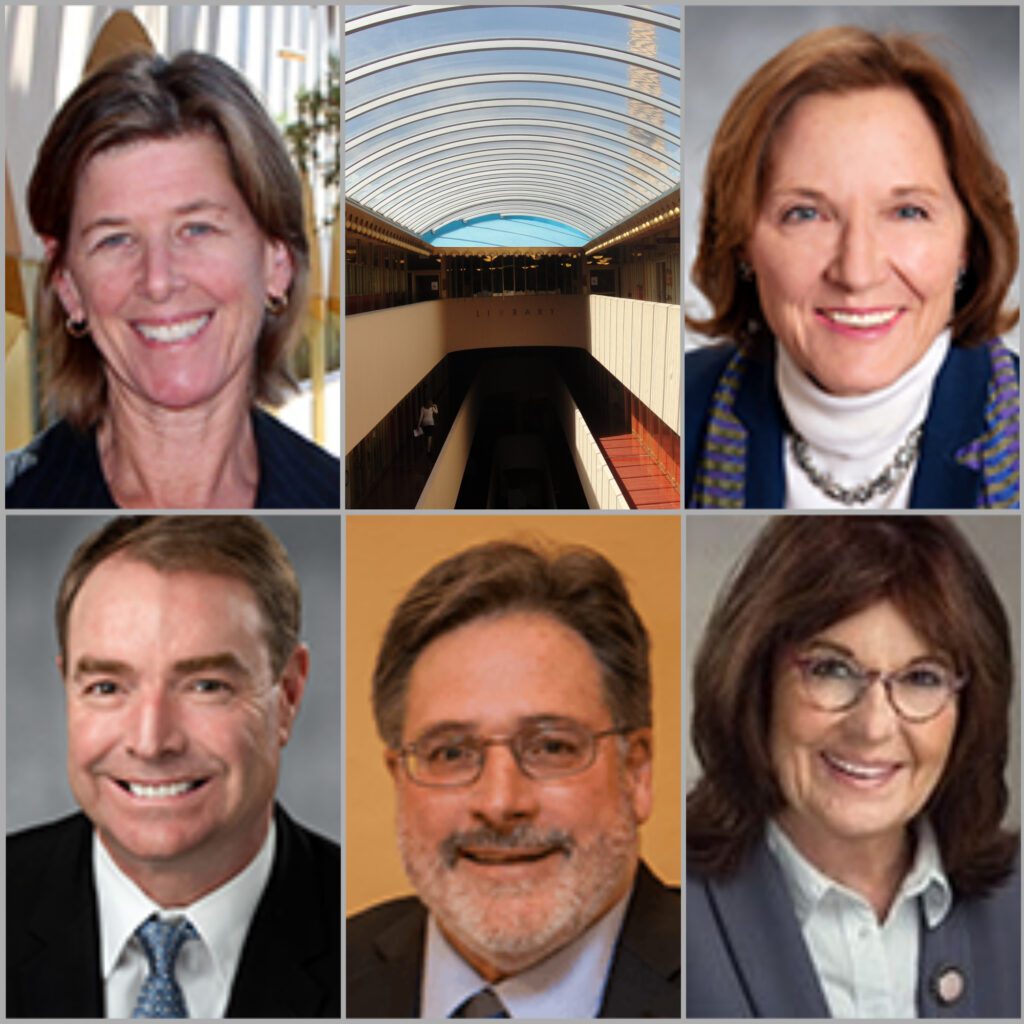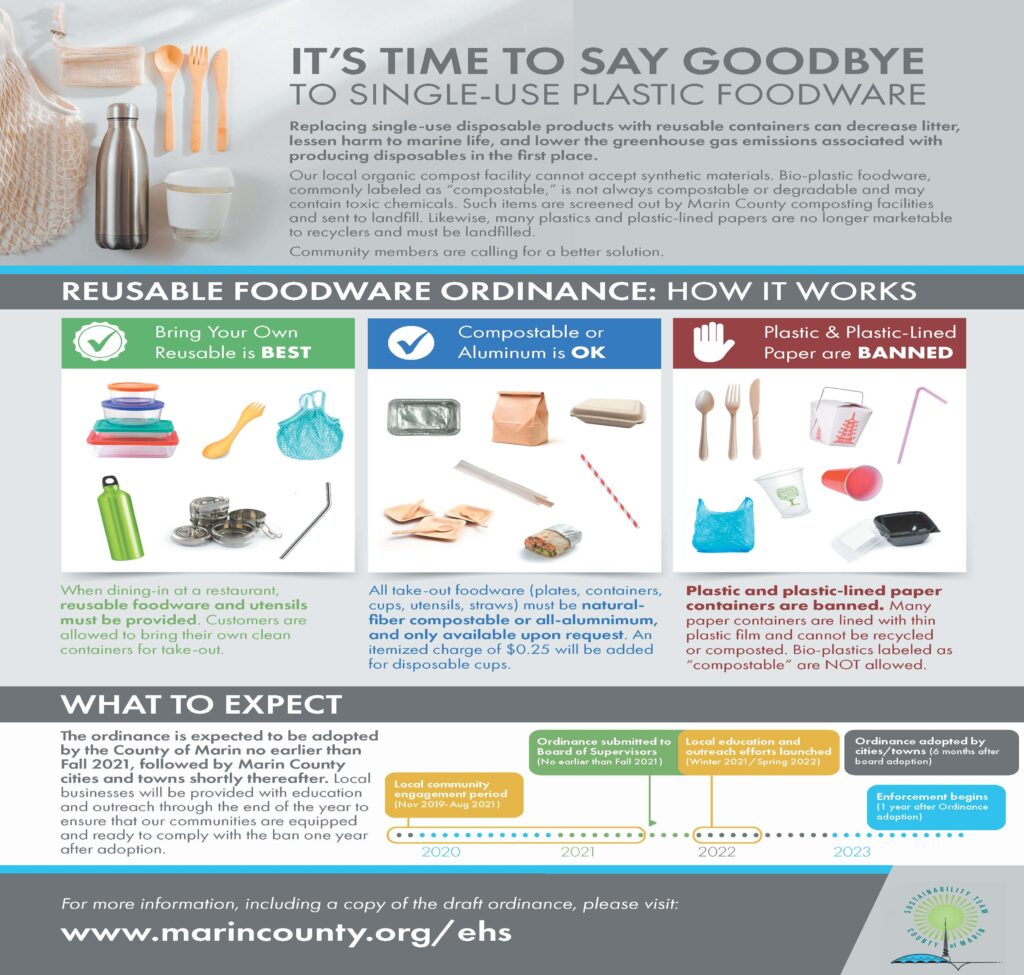
Marin County officials took a step forward in their efforts to combat climate change this week by passing a ban on the use of single-use plastic foodware. In doing so, it garnered cautious support from the restaurant community and the Marin Council of Chambers with its decision to emphasize education and more grant funding to support technical assistance, with an 18-month runway for enforcement.
“Let’s work with our local restaurants and make adjustments after 18 months as they are needed,” said Supervisor Stephanie Moulton-Peters, who represents southern Marin. “We’re not in enforcement mode, we’re in education and training mode. The chambers worked through what they would need and it’s very doable.”
A vote on the ordinance had been delayed due to the horrific impact of the COVID-19 crisis on food-serving businesses, and pushback from the business community centered primarily on timing, not a willingness to back the ordinance, as the Marin IJ made clear in an editorial.
A final vote is set for May 10. If adopted then, the law would take effect on Nov. 10, 2023. Local governments not within unincorporated Marin would have 12 months to pass the same ordinance for their municipality.
“There’s a lot of interest in the grant program,” said Claire Wilson of R3 Consulting Group, which is spearheading the ordinance, noting that there is funding leftover from that program, and the board indicated an interest in adding more funds to support it.
“That could be a critical part of the education and outreach to have a program that people can reach out to,” Moulton-Peters added.
Supervisor Damon Connolly suggested that county officials do a check-in with the program after 12 months “to see where things are at in terms of outreach and education and how successful is it has been so far, and if we need to provide more support to the businesses.”
When enforcement does begin after 18 months, it would lead with education and occur within the normal, twice-yearly food inspection visits by officials from the county’s Environmental Health Services agency, officials said.
The new law would require grocery store food counters, restaurants, delis, bakeries, farmers markets, food trucks, carry-out vendors and other food service providers to use natural-fiber compostable foodware. Banned materials include disposable forks, spoons, knives, chopsticks, napkins, cup sleeves, food wrappers, beverage trays, condiment containers, toothpicks and straws. Food-serving businesses could only make those materials available “upon request” or at a self-serve takeout station. Plastic straws could be made available on request, but only to accommodate people with “access needs,” per the ordinance.
One of the positive developments of delay around the ordinance’s passage was an evolution that expanded the emphasis on reusable foodware for dine-in restaurant visits, in addition to compostable foodware for takeout and delivery.

The ordinance’s passage drew widespread praise from environmental activists who’d been creating a movement towards a plastic-free Marin for years. “According to the International Energy Agency, plastics are set to drive nearly half of oil demand growth by mid-century,” Fairfax Councilmember Renee Goddard told the board. “The fossil fuel corporations are ramping up their output of plastic to hedge against the possibility that a serious global response to climate change might reduce the demand for their fuels.”
Restaurant industry and chamber officials emphasized that their concerns about the ordinance over the past two years was more about timing than whether or not it was the right move for the county in the long-term.
“In passing a foodware ordinance that emphasizes education and grants for technical assistance over near-term enforcement, the supervisors factored in the significant challenges the restaurant community faces,” said Hunter Moore, board chair of the Mill Valley Chamber. “We’re grateful for their consideration. In terms of next steps our members focus is on timing, education and support for the implementation of these vital sustainability measures.”
The ongoing debate around the possible inclusion of bioplastic products, which are made using renewable sources such as corn and sugarcane instead of petroleum and are more widely available and less costly, continued during the hearing. Executives at Amy’s Kitchen have urged county officials to convince WM Earthcare, the owner of the Redwood Landfill where Marin’s refuse goes, to accept 100% certifiable compost as well as bioplastics and process them via dual streams.
“Many of Marin’s ranches and agricultural operations are certified organic and need a local source of organic compost and soils,” wrote Dana Armanino, Marin County’s senior sustainability planner, told the Marin Independent Journal. “By producing organic certified compost, Redwood Landfill is helping us close the loop in food production and waste.”
Wilson noted the temporary exemptions provided in the ordinance when compostable foodware products are not yet available, as is the case with many products, particularly given the recent supply chain crisis, as well as the seemingly ever-increasing cost associated with some of those products.
The ordinance would require vendors to charge customers 25 cents for take-out cups.The vendor would get to keep the income, and exemptions from the fee would be provided to people receiving government food aid, such as CalFresh/SNAP and WIC.
The county is offering to bear the ongoing cost of enforcing the ban for any Marin municipality that signs on to the program. County officials have offered to remove this barrier if jurisdictions adopt a single-use foodware ordinance within a year of the county doing so, according to the IJ.
The county’s ban on the use of single-use plastic foodware puts it ahead of an initiative — known as the California Recycling and Plastic Pollution Reduction Act — that would require all single-use plastic packaging and food ware used in California to be recyclable, reusable, refillable or compostable by 2030, and single-use plastic production to be reduced by 25% by 2030, according to the Los Angeles Times.
Currently, 85% of single-use plastics are not recycled, and single-use plastics make up 50% of plastic waste, the Times reported.

